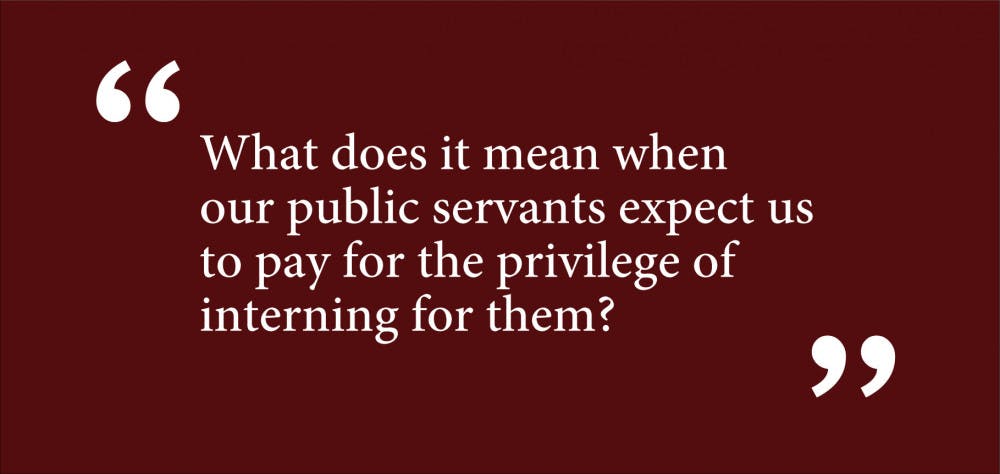What do Donald Trump, Chuck Schumer and Paul Ryan all have in common? It sounds like I’m about to write a joke about the lack of diversity among federal politicians. That’s certainly tempting, but as I’m bombarded with emails about career fairs and resume-writing workshops, there’s another, not entirely unrelated, issue at the front of my mind: None of them pay their interns.
Trump boasts about how the economy and the job market have improved under his presidency. But while 21 departments in the White House offer internships, all are unpaid. Schumer was involved with co-sponsoring the Minimum Wage Fairness Act, which would have eventually raised the federal minimum wage to $10.10 per hour, but Schumer’s interns currently work for free. Paul Ryan has, so far, raised over $10 million for his 2018 campaign, yet has the gall to say that he is “unable to offer paid internships.”
If politicians want to make a statement about economic equality, if they want to drain the swamp of the Washington elite and open up opportunities for economically disenfranchised Americans, then they should start with their own hiring policies, and compensate their interns for the work they do. In addition, because race and wealth are inextricably tied, unpaid work poses an additional barrier for students from underrepresented minorities seeking government work. Though there is an awareness in Washington among senators like Schumer that the lack of diversity in the Senate is a huge problem, there has not been enough attention devoted to making access to government jobs more equitable.
Penn estimates that it would cost students a minimum of $4,500 to work an eight-week internship in Washington, D.C. Time had a higher estimate in 2016, calculating that it would cost around $6,200 to spend 10 weeks at an internship in one of the five cities that students most wanted to intern in, D.C. included. Whatever the exact number, the point remains that it’s expensive: According to the Council for Community and Economics Research’s report from the second quarter of 2017, D.C. had the fifth highest cost of living in the United States.
The only students who can afford to take unpaid internships with the government, then, are the ones who have several thousand dollars saved. They’re the ones who don’t have to worry about earning money to pay for the following semester. The government officials who refuse to pay their interns ensure that the connections, recommendations and experience gained from a summer on Capitol Hill are reserved only for the financially secure.
This issue crosses party lines. One wouldn’t be faulted for assuming that Democrats would pay at a higher rate than Republicans; after all, it’s typically the left that campaigns for minimum wage increases. But White House interns were unpaid under Obama, just as they are now under Trump.
This bipartisan reliance on unpaid interns is further highlighted by a 2017 report from Pay Our Interns, an organization which “advocates for an increase in the amount of paid internships within our government, for-profit, and nonprofit sector(s),” which showed that while 8 percent of Republicans in the House paid their interns, only 3.6 percent of Democrats did as well. Apparently it’s easy to support pay increases in theory, but when it comes to putting your money where your mouth is — well, that’s a little harder.
It’s not impossible, certainly; Bernie Sanders does, in fact, pay his interns $15 per hour, the minimum wage that he has repeatedly endorsed. But Elizabeth Warren, another well-recognized progressive on Capitol Hill, only offers the vague statement that a stipend might be available to students who aren’t getting academic credit or receiving funding from other sources. Political leaning doesn’t mean much when it comes to paying your workers.
Students without the means to easily fund their own unpaid internships are left with an uncomfortable choice. They can stretch their finances to the breaking point, maybe taking out more loans to pay for the next semester. On the other hand, they can eschew whatever free time they would have had to explore D.C. and take on a second, paying job.
Of course, they could just not aim for an internship with Congress or the White House. They could spend the summer working for a local politician, saving money while living at home. Or they could find a different, paying job or internship altogether.
But the fact that students have other options makes the existence of unpaid internships no less disturbing. What does it mean when our public servants expect us to pay for the privilege of interning for them? When the officials who are supposed to represent us, who are supposed to be pushing for our best interests, are only willing to offer positions to people who can either afford it or who are willing to make significant financial sacrifices?
If politicians won’t begin paying interns on their own, then it falls to their constituents to pressure them until they do. It’s time to stop normalizing unpaid labor. The only way to have a government for the people is to have a government made of the people, and that won’t be possible until everyone has an equal chance to make their way into the political arena.
Caroline Mulligan ’19 can be reached at caroline_mulligan@brown.edu. Please send responses to this opinion to letters@browndailyherald.com and other op-eds to opinions@browndailyherald.com.





